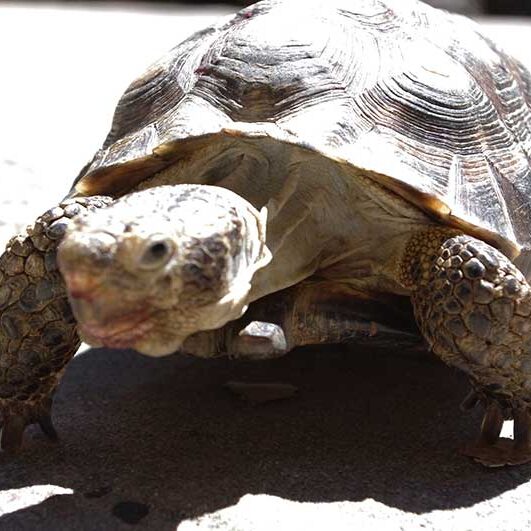Animals
Desert Tortoise

Latin Name
Gopherus agassizii and Gopherus morafkai
History at CuriOdyssey
CuriOdyssey is home to two male desert tortoises. One was found walking down the street in Santa Cruz. He was taken to native animal rescue to be evaluated and fostered for placement and was transferred to CuriOdyssey in May of 1999. The other male was brought into Silicon Valley Turtle & Tortoise Rescue, which donated him to CuriOdyssey in 2009. He is believed to be of the Mojave Desert subspecies.
Fun Facts about Desert Tortoise
One of our tortoises is a very messy eater. When he is done eating the keepers have to take a toothbrush and warm water to clean all of the food stuck to his beak.
What do Desert Tortoise eat?
Desert tortoise consume desert herbs, grasses, flowers, cacti, and fruit. At CuriOdyssey, they are served a variety of organic native grasses, weeds, and plants grown in the tortoise garden and cactus.
During Winters, most desert tortoises hibernate in the winter and choose not to eat. During this time we do occasionally offer dried orchard grass and a small variety of greens, but it is rarely eaten.
How long do Desert Tortoise live?
In the Wild: Estimated 50 to 80 years, however approximately only one 1 in every 75 baby tortoises will live to 20 years old. Most hatchlings live less than one year.
In Captivity: 80+ years (reported in 1980 by a private owner whose family acquired the tortoise between 1900-1910).
Where do Desert Tortoise live?
Desert tortoise live in desert regions, canyons bottoms, and rocky hillsides. Their range extends in the Mojave and Sonoran deserts of the southwestern USA and Mexico.
Are Desert Tortoises endangered?
This animal is an endangered species and fully protected by the state of California. Habitat destruction, pet trade, and automobiles have reduced their numbers greatly. In 1974 a law was passed making the collection of wild tortoises illegal. To preserve the desert tortoise the Bureau of Land Management has established a 61 km (38 sq mi) sanctuary in California as the Desert Tortoise Natural Area. This preserve is closed to all vehicles, livestock grazing, and mineral exportation.
SPONSOR AN ANIMAL
Help provide for the care and feeding of our wildlife guests by sponsoring an animal of your choice for a year.
Join the CuriOdyssey Community
LOCATION
1651 Coyote Point Drive
San Mateo, CA 94401
Ohlone Land Acknowledgement
650-342-7755
info@curiodyssey.org
CuriOdyssey is a 501(c)(3) non-profit, Tax ID 94-1262434

